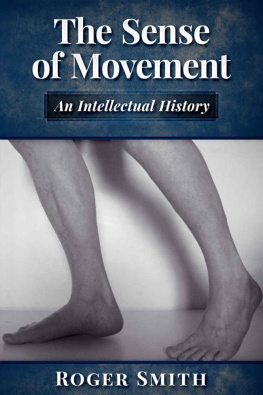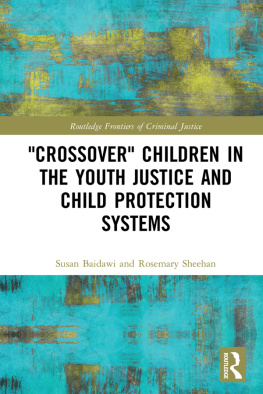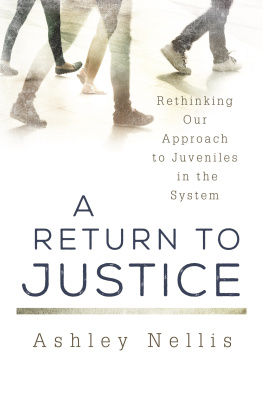
Diversion is a vital and yet strangely neglected and often misunderstood concept in youth justice discourse. By reclaiming diversion and by historicising, theorising and applying the concept, Roger Smith makes an indispensable and timely contribution to youth justice scholarship. His book is rigorous, challenging and provocative. It sets an agenda for new thinking and it will be widely read.
Professor Barry Goldson , Charles Booth Chair of Social Science,
Department of Sociology, Social Policy and Criminology,
The University of Liverpool
Diversion in Youth Justice provides definitive overview of a key aspect of youth justice, bringing a critical, incisive and informed perspective to the subject, presented in Smiths inimitably accessible and dynamic writing style.
Stephen Case , Professor of Criminology and Director of Studies,
Department of Social Sciences, Loughborough University
Diversion in Youth Justice focuses on important questions: why do we need to prosecute? Why dont we divert more children and young people away from a system if it is ultimately damaging to them? Or is diversion from formal prosecution a mistake? Analysing shifts in thinking about diversion across time, Roger Smith offers us an account which has, at its heart, a quest for progressive social and criminal justice for children and young people who find themselves in conflict with the law, concluding that diversion itself can be transformational. The author offers deep critical reflection and analysis, and a book which is both candid and searching. An essential read!
Professor Loraine Gelsthorpe ,
Director of the Institute of Criminology,
University of Cambridge
Diversion in Youth Justice
Diversion in youth justice is a subject of enduring interest. It concerns the processes by which decisions are made about whether or not to prosecute young offenders, and this book explores the continuing debates and historical developments which shape these processes. The treatment of young offenders is a contentious subject, and this book provides a comprehensive review of out of court decision-making in the context of wider arguments about how we should deal with the crimes of the young.
This book follows a broadly historical structure, exploring the development of ideas and approaches to agency decision-making at the point of prosecution. This leads to the identification of a number of distinctive models of diversion, reflecting both specific periods of time and particular philosophies of intervention with young people in trouble with the law. Based on this classification, this book explores the implications for wider debates about childhood, crime and punishment and how these relate to theories of social control. This, in turn, leads to the conclusion that diversionary ideas and practices act as a kind of barometer for wider developments in the governance of youth.
This is one of the very few books that focuses exclusively on diversion as a feature of youth justice, and it provides a range of original and contemporary insights into this subject area which remains of considerable interest in this field, both academically and in practice. The ideas outlined here will contribute to new thinking in youth criminology, as the discipline responds to a prolonged period of apparent liberalisation in the treatment of young offenders which has yet to be fully understood or properly theorised.
Roger Smith is Professor of Social Work at Durham University, UK. As a practitioner, and in a senior policy role, he specialised in youth justice, and he has pursued this area of interest in his academic research and writing (including the well-known book Youth Justice: Ideas, Policy, Practice) . He has also been involved in research and publications on a wider range of subjects, including childhood ( A Universal Child ), social work and power ( Social Work and Power ), participatory methods and social work education, and he retains a continuing interest in researching and promoting childrens rights in practice ( Social Work with Young People ).
Routledge Frontiers of Criminal Justice
A full list of titles in this series is available at: https://www.routledge.com/ Routledge-Frontiers-of-Criminal-Justice/book-series/RFCJ
Recently published titles:
- 43. Young Offenders and Open Custody
Tove Pettersson - 44. Restorative Responses to Sexual Violence
Legal, Social and Therapeutic Dimensions
Edited by Estelle Zinsstag and Marie Keenan - 45. Policing Hate Crime
Understanding Communities and Prejudice
Gail Mason, JaneMaree Maher, Jude McCulloch, Sharon Pickering, Rebecca Wickes
and Carolyn McKay - 46. The Special Constabulary
Historical Context, International Comparisons and Contemporary Themes
Edited by Karen Bullock and Andrew Millie - 47. Action Research in Criminal Justice
Restorative Justice Approaches in Intercultural Settings
Edited by Inge Vanfraechem and Ivo Aertsen - 48. Restoring Justice and Security in Intercultural Europe
Edited by Brunilda Pali and Ivo Aertsen - 49. Monitoring Penal Policy in Europe
Edited by Gatan Cliquennois and Hugues de Suremain - 50. Big Data, Crime and Social Control
Edited by Ale Zavrnik - 51. Moral Issues in Intelligence-led Policing
Edited by Nicholas R. Fyfe, Helene O. I. Gundhus and Kira Vrist Rnn - 52. The Enforcement of Offender Supervision in Europe
Understanding Breach Processes
Edited by Miranda M. Boone and Niamh Maguire - 53. Diversion in Youth Justice
What Can We Learn from Historical and Contemporary Practices?
Roger Smith
Diversion in Youth Justice
What Can We Learn from Historical
and Contemporary Practices?
Roger Smith
First published 2018
by Routledge
2 Park Square, Milton Park, Abingdon, Oxon OX14 4RN
and by Routledge
711 Third Avenue, New York, NY 10017
Routledge is an imprint of the Taylor & Francis Group, an informa business
2018 Roger Smith
The right of Roger Smith to be identified as author of this work has been asserted by him in accordance with sections 77 and 78 of the Copyright, Designs and Patents Act 1988.
All rights reserved. No part of this book may be reprinted or reproduced or utilised in any form or by any electronic, mechanical, or other means, now known or hereafter invented, including photocopying and recording, or in any information storage or retrieval system, without permission in writing from the publishers.
Trademark notice : Product or corporate names may be trademarks or registered trademarks, and are used only for identification and explanation without intent to infringe.
British Library Cataloguing in Publication Data
A catalogue record for this book is available from the British Library
Library of Congress Cataloging-in-Publication Data
A catalog record for this book has been requested
ISBN: 978-1-138-69728-7 (hbk)
ISBN: 978-1-315-52225-8 (ebk)
Typeset in Times New Roman
by HWA Text and Data Management, London
Getting into diversion
This book is an account which draws on two interlinked journeys. One is mine, in that I have been involved professionally with youth diversion in a number of guises for over thirty years. In travelling this road, though, I have also become increasingly familiar with the path followed over a much longer period by the various practices which have fallen under the heading of youth (or juvenile) diversion, constituting the process of out of court or pre-prosecution decision-making and intervention in respect of young people who are officially identified as offenders. I hope that my own multi-faceted experience of this process and its outcomes will provide a helpful backdrop to a wider discussion of the histories, ideas and practices which it represents.









